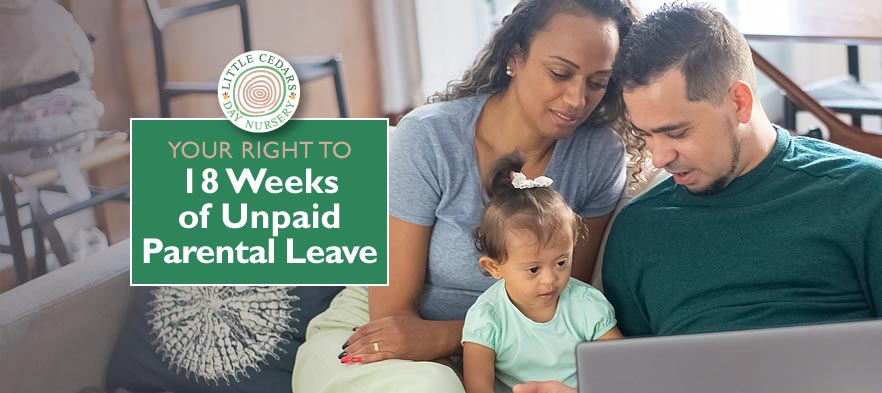
 If you were a full-time employee when you had your child, perhaps you’d rather go part time while your child is under five. Or maybe you want to explore the option of flexitime with your employer. Perhaps you’d like to ask if job sharing is possible, or whether you can work only on specific days of the week. What are the rules, though? Does your employer have to offer part-time or flexible working now you’re a parent, or are they under no statutory obligation to do so? Today we take a look at the rules.
If you were a full-time employee when you had your child, perhaps you’d rather go part time while your child is under five. Or maybe you want to explore the option of flexitime with your employer. Perhaps you’d like to ask if job sharing is possible, or whether you can work only on specific days of the week. What are the rules, though? Does your employer have to offer part-time or flexible working now you’re a parent, or are they under no statutory obligation to do so? Today we take a look at the rules.
In particular, new parents may start to re-think going back to work full time once maternity* leave comes to an end. The nearer their return date gets, the more new parents begin to think about the possible complications that may follow. These may include the ability to drop off or pick up their infant in time from the nursery, or even getting home in time to see them before their bedtime. Being apart can also be a real wrench after spending perhaps every hour of their parental leave with their infant.
Example
Florence works in sales of new homes for a large house builder. She works full time on weekdays, from 9.30 a.m. to 6.00 p.m. The sites where she works can be anywhere from 10 minutes away to over an hour-and-a-half from her home depending upon where she’s based at any particular time of the year.
Florence goes on maternity leave, fully intending to go back full time once it comes to an end. However, when the date for returning nears, she has a change of heart. Firstly, she’ll miss her child growing up too much if she goes back full time. Secondly, this may be compounded if her employer still expects her to work miles and miles away from home. That would make pick-up from the nursery in time impossible — indeed, she would have to find someone else to pick her child up. It may even mean that she will miss her infant’s evening bedtime on working days. She’s concerned that she just won’t get to see her child much and will miss out on a big part of their early childhood if her working pattern isn’t changed.
Florence decides to ask to go back part-time (3 days per week) and makes contact with her employer to make the request.
Considerations when making a Flexible Working Request
 The rules state that employees can only make ONE request for a change to their contracted hours/days per year. This must be in writing and is called a ‘Flexible Working Request’. So Florence’s request will need to cover all bases because she won’t get another chance for another request until another year has passed.
The rules state that employees can only make ONE request for a change to their contracted hours/days per year. This must be in writing and is called a ‘Flexible Working Request’. So Florence’s request will need to cover all bases because she won’t get another chance for another request until another year has passed.
So, Florence’s particular application needs to include:
- the request to reduce from five-days-a-week to just three;
- the request, if applicable, to reduce or alter the working hours so that the timings fit better with nursery drop-off and pick-up times;
- a request to only be sent to working locations within shorter distances, so she can still make drop-off and pick-up times for her child’s childcare.
If she misses any of these out, she’ll have to wait another year before being able to re-apply, according to the rules. This assumes her employer is sticking inflexibly to the rules, of course; kind-hearted, family-friendly employers may indeed allow more flexibility but employers are under no statutory obligation to do so.
It’s important to understand is that, while an eligible employee has a right to apply for a flexible working request and their employer is obligated to consider it, they are not obligated to accept it if it means that their business will no longer function properly.
The employee must also have been employed in the job for no less than 26 weeks (6 months) in order to be eligible to make the request, by the way. However, again, some more family-friendly employers may be more flexible even though they’re not obliged to be by law.
The Employer’s Response
 The employer must give the employee who makes the Flexible Working Request a decision within 3 months unless the employee agrees to extend that time. This must be done having considered the facts carefully and fairly and without basing it on just a ‘personal’ opinion. They should also discuss the application with the applicant and, if it’s not possible to accept the specific suggestions requested, they should consider whether alternative options are possible.
The employer must give the employee who makes the Flexible Working Request a decision within 3 months unless the employee agrees to extend that time. This must be done having considered the facts carefully and fairly and without basing it on just a ‘personal’ opinion. They should also discuss the application with the applicant and, if it’s not possible to accept the specific suggestions requested, they should consider whether alternative options are possible.
Unsuccessful Applications
Employers can turn down requests outright if they feel their business will not be able to function properly if the new suggestions are put in place. Examples of reasons why an application for Flexible Working Requests may lawfully be turned down can be seen here. It is possible for the employee to appeal the decision if they feel all factors have not been considered or if the correct policies have not been properly followed. It’s also possible for them to take legal action (an employment tribunal) or to apply to the ACAS Arbitration Scheme in some circumstances (see previous link and scroll down for further information about that).
Successful Applications
If the employer approves the parent’s flexible working application, then the employee’s employment contract will usually need to be updated to reflect the new working pattern. Employers should also confirm the agreed changes in writing, including start dates, working hours, pay, location, holiday entitlement and so on.
Little Cedars Day Nursery: Good Childcare in Streatham
We hope this rough guide to Flexible Working Requests is useful and wish anyone making one the very best of luck for a successful outcome.
 We are Little Cedars, an excellent nursery and pre-school in Streatham. We’re also very convenient for those looking for nurseries and childcare services near Streatham Common, Streatham Hill, Streatham Park, Furzedown, Tooting, Tooting Bec, Tooting Broadway, Tooting Common, Balham, Norbury and Colliers Wood. Please contact us with any questions, to arrange a visit or to apply for a place for your child. We’ll be happy to help:
We are Little Cedars, an excellent nursery and pre-school in Streatham. We’re also very convenient for those looking for nurseries and childcare services near Streatham Common, Streatham Hill, Streatham Park, Furzedown, Tooting, Tooting Bec, Tooting Broadway, Tooting Common, Balham, Norbury and Colliers Wood. Please contact us with any questions, to arrange a visit or to apply for a place for your child. We’ll be happy to help:
*N.B. we say maternity leave throughout this article for the sake of brevity. However, the rules also apply for those who have been on paternity leave, parental leave or even if parents haven’t been on leave at all — and simply want to alter their working days/times to better suit their young families.


 Your Right to Unpaid Parental Leave
Your Right to Unpaid Parental Leave For example, there may come a time when parents need to look at nurseries, pre-schools, primary and secondary schools and, as children approach their mid teens, further education settings. Other reasons to take time off might include time for parents to visit relatives with the children, or to investigate extra-curricular activities such as sports clubs, or simply to spend quality time with their children.
For example, there may come a time when parents need to look at nurseries, pre-schools, primary and secondary schools and, as children approach their mid teens, further education settings. Other reasons to take time off might include time for parents to visit relatives with the children, or to investigate extra-curricular activities such as sports clubs, or simply to spend quality time with their children. It doesn’t really matter if you change jobs. The rules around unpaid parental leave apply in relation to your child(ren); not your employer. So, if you change jobs and have already used up 9 weeks of unpaid leave for one child during your previous job, then you can still use another 9 weeks, so long as it’s taken before your child reaches the age of 18.
It doesn’t really matter if you change jobs. The rules around unpaid parental leave apply in relation to your child(ren); not your employer. So, if you change jobs and have already used up 9 weeks of unpaid leave for one child during your previous job, then you can still use another 9 weeks, so long as it’s taken before your child reaches the age of 18. To claim a period of unpaid parental leave, just 21 days (3 weeks) of notice must be given to the employer and this must state the start and finish dates. It can be confirmed verbally although employers may request the notice in writing.
To claim a period of unpaid parental leave, just 21 days (3 weeks) of notice must be given to the employer and this must state the start and finish dates. It can be confirmed verbally although employers may request the notice in writing. We hope that the information brought to you here is useful. We are Little Cedars, a wonderful
We hope that the information brought to you here is useful. We are Little Cedars, a wonderful 